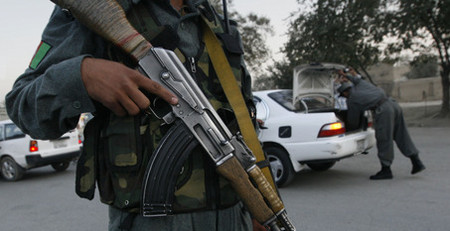By Dion Nissenbaum
Although the members of Afghanistan's elite new police force have been touted as the country's best and brightest, U.S. military strategists find that they're plagued by the same problems as Afghanistan's conventional police, who are widely considered corrupt, ineffective and inept.

Like the discredited police officers they were supposed to supplant, ANCOP members set up checkpoints designed to do little more than shake down Afghans, according to U.S. officials briefed on the RAND Corp. analysis.
Nevertheless, U.S. and Afghan government strategists are counting on the new Afghan National Civil Order Police to play a central role in an operation this summer to seize full control of Kandahar, the Taliban's spiritual capital in southern Afghanistan.
In the weeks since they were sent to Helmand province as part of the U.S.-led offensive in Marjah, ANCOP members have set up checkpoints to shake down residents, been kicked out for using drugs and shunned in some areas as outsiders, according to U.S. officials briefed on a recent analysis by the RAND Corp.
More than a quarter of the officers in one ANCOP battalion in Helmand were dismissed for drug use, and the rest were sent off for urgent retraining. One Western official who attended the briefing termed ANCOP's role in Marjah a disaster. The official spoke only on the condition of anonymity because of the sensitivity of the issue.
"ANCOP is not necessarily the answer to the maiden's prayer when it comes to security," said Canadian Brig. Gen. Craig King, the Kandahar-based director of future plans for international forces in Afghanistan. "They're just like any other unit here that you have to ensure their conduct is professional."
Western leaders have been counting on ANCOP forces as trailblazers in the effort to establish a trusted police force. The performance of Afghan security forces is likely to be a topic of discussion this week when Afghan President Hamid Karzai meets President Barack Obama in Washington.
Last week, the head of NATO's police training mission in Afghanistan hailed ANCOP at a Kabul graduation ceremony for the first class in a new officer-training program.
"As leaders in ANCOP, you are considered the most trusted law enforcement officials in your nation," U.S. Lt. Gen. William B. Caldwell told the officers. "The people in Helmand requested your presence because of your reputation for honor and integrity and fairness and equality. Your corps is laying the foundation for the future of the Afghan national police."
Helmand was meant to serve as a proving ground for the ANCOP forces.
American leaders sent hundreds of ANCOP officers to Marjah to show skeptical residents of the Taliban stronghold that the days of corrupt police officers were coming to an end.
In some areas, ANCOP forces quickly gained the respect of U.S. Marines and local residents, who came to view the officers as better than the Afghan soldiers who'd been sent to Marjah.
U.S. Marines in northern Marjah, however, faced serious problems from the start.
In the early days of the operation, the Marines temporarily sidelined an entire ANCOP battalion after one-quarter of the 179 police officers tested positive for drug use. The problems with ANCOP in Marjah didn't end there.
Like the discredited police officers they were supposed to supplant, ANCOP members set up checkpoints designed to do little more than shake down Afghans, according to U.S. officials briefed on the RAND Corp. analysis.
The preliminary analysis, conducted by RAND researcher S. Rebecca Zimmerman, found that ANCOP officers didn't win residents' trust in part because many were Tajik Afghans, whom the predominantly Pashtun population in Helmand viewed as unreliable outsiders, according to U.S. officials briefed on the study.
Skepticism about the U.S.-led Marjah operation also emerged in a recent survey by the International Council on Security and Development, a London research center, which interviewed 400 Afghan men in southern Afghanistan.
More than 60 percent of those interviewed said they had less respect for NATO after the military operations in Marjah.
U.S. military officials conceded that there'd been problems in Helmand with the police experiment, but they said they'd been isolated and resolved quickly.
"At times it's disappointing, but not surprising," said U.S. Army Brig. Gen. Anne F. Macdonald, NATO's assistant commanding general for police development. "It takes time to teach them, and it takes just one guy to ruin their reputation."
The Afghan civil police are a relatively new creation akin to the U.S. National Guard, the French gendarmerie or the Italian carabinieri. Members are required to have basic reading and writing skills, and they're usually drawn from a more selective pool than the regular Afghan police officers.
The effort to expand the ANCOP force, which hovers around 5,000, also faces a daunting turnover rate that's sometimes hit 70 percent. The Afghan government is trying to counter the problem by offering better pay and more vacation time.
Macdonald said the overarching issues had been addressed, but the preliminary RAND analysis found that ANCOP has been unable to deal with the systemic problems.
The troubles that emerged in Helmand could damage the U.S.-led mission this summer, when ANCOP units are expected to play a central role in trying to gain full control of Kandahar. A first assignment will be to set up a ring of checkpoints around the heart of the city.
The plan - which Afghan officials have dubbed a "cummerbund" - could falter quickly if Afghan police use the checkpoints to steal money from Kandahar residents.
"Shaking down the population is something that we and the ANP" - the Afghan National Police - "are very sensitive to," said King, the Canadian general who's involved in planning the Kandahar operations.
Macdonald said military trainers were working constantly to address the problems.
"We are teaching ethics at every level," Macdonald said. "Good leaders don't allow that to happen. We don't tolerate it, and I think in time they're going to stop."



